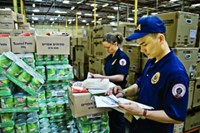Advertisement
Grab your lab coat. Let's get started
Welcome!
Welcome!
Create an account below to get 6 C&EN articles per month, receive newsletters and more - all free.
It seems this is your first time logging in online. Please enter the following information to continue.
As an ACS member you automatically get access to this site. All we need is few more details to create your reading experience.
Not you? Sign in with a different account.
Not you? Sign in with a different account.
ERROR 1
ERROR 1
ERROR 2
ERROR 2
ERROR 2
ERROR 2
ERROR 2
Password and Confirm password must match.
If you have an ACS member number, please enter it here so we can link this account to your membership. (optional)
ERROR 2
ACS values your privacy. By submitting your information, you are gaining access to C&EN and subscribing to our weekly newsletter. We use the information you provide to make your reading experience better, and we will never sell your data to third party members.
Safety
Food Safety Reform
Latest Salmonella outbreak has renewed calls for a single food agency
by Britt E. Erickson
February 23, 2009
| A version of this story appeared in
Volume 87, Issue 8

THE CURRENT OUTBREAK of Salmonella typhimurium in peanut products, which has sickened more than 600 people and killed at least nine, has prompted experts to take a closer look at what can be done to strengthen food safety regulations in the U.S.
A consensus is emerging that "at the very least we have holes in our food safety net. More likely, we have a broken system," said Sandra A. Hoffmann, a fellow at the economic think tank Resources for the Future, as she kicked off a panel discussion on reforming food safety regulations at RFF earlier this month.
A recurrent theme that ran through the discussion at RFF was how to fix the fragmented food safety system in the U.S.—one in which responsibilities are divided among multiple federal agencies, including the Department of Agriculture, the Food & Drug Administration, the Environmental Protection Agency, and the Centers for Disease Control & Prevention.
"Fragmentation of federal oversight of food safety is something that [the Government Accountability Office] thought was so critical that we put it on our high-risk list back in 2007," said Lisa R. Shames, GAO's director of natural resources and environment, at the meeting. "There are 15 agencies that oversee 30 food-related laws. This fragmentation has caused inconsistent coordination, ineffective oversight, and additional use of resources." GAO, the investigative arm of Congress, continues to consider food safety a top priority.
The discussion at RFF quickly turned to splitting FDA into two agencies: one dedicated to food safety and the other to drug and medical device safety.
J. Glenn Morris Jr., director of the Emerging Pathogens Institute at the University of Florida, acknowledged that problems are likely to arise from combining food safety agencies, but he said it was time to "bite the bullet." He noted that other developed countries have recently reorganized their food safety systems.
Although nearly everyone on the panel agreed that something needs to be done to prevent future outbreaks of food-borne illness or the next melamine scandal (C&EN, May 12, 2008, page 41), many urged caution regarding food safety reform, particularly with respect to creating a single food agency.
"A lot of mergers fail," Shames pointed out, adding that performance is often diminished initially after large reorganizations. She noted that GAO considers the Department of Homeland Security, an agency created by consolidating multiple groups from various agencies into one, a federal program that is at high risk of waste, fraud, and abuse.
Several panel members highlighted the fact that each agency that is responsible for food safety in the U.S. gets its authority under a different law. Those laws each have different requirements and standards. People within the new agency "will instantly stovepipe along statutory lines," predicted Richard A. Williams, managing director of the regulatory studies program and government accountability project at George Mason University. "It would be an enormous waste of energy and effort to put these agencies together as they are, without fixing their statutes first," agreed Michael R. Taylor, a professor at George Washington University School of Public Health & Health Services.
As the RFF discussion was occurring, legislators and other food safety experts were on Capitol Hill talking about the same issue. At a press conference to discuss the current Salmonella outbreak, Rep. Rosa L. DeLauro (D-Conn.), chair of the House Agriculture, Rural Development, FDA & Related Agencies Appropriations Subcommittee, announced that she was reintroducing the Food Safety Modernization Act (H.R. 875). The bill would create a single, independent food safety agency and a program focused on prevention rather than response.
"FDA's food safety program is primarily remedial. The agency waits until reports of illness and death accumulate before it takes action," said Chris Waldrop, director of the nonprofit Consumer Federation of America's Food Policy Institute, in a statement. He added that DeLauro's bill introduces a "new paradigm" requiring a dedicated food agency "to adopt a program that prevents food-borne illness."
KEY MEMBERS of the House Energy & Commerce Committee also introduced legislation—H.R. 759, the FDA Globalization Act—in response to the latest Salmonella outbreak. That bill would provide FDA with additional funding for inspections of food facilities and would require food manufacturers to have a preventive food safety plan, two things that could have helped prevent the current outbreak, experts say. In addition, H.R. 759 would enhance FDA's ability to trace the origin of a food and give the agency authority to mandate recalls of unsafe food. Currently, FDA relies on food companies to voluntarily recall contaminated products.
The topic of a single food agency came up again during a Feb. 5 hearing of the Senate Agriculture, Nutrition & Forestry Committee related to the recall of peanut products.
"To deal with the root of the problem, Congress and the Obama Administration will need to go beyond making a few quick fixes. Structural reforms are also essential," testified Caroline Smith DeWaal, director of food safety at the nonprofit Center for Science in the Public Interest. She emphasized that FDA must divide its attention among drugs, medical devices, foods, and cosmetics. "Food issues frequently fall to the bottom of the pile," she noted. "It is time to elevate food-monitoring functions within the Department of Health & Human Services."





Join the conversation
Contact the reporter
Submit a Letter to the Editor for publication
Engage with us on Twitter